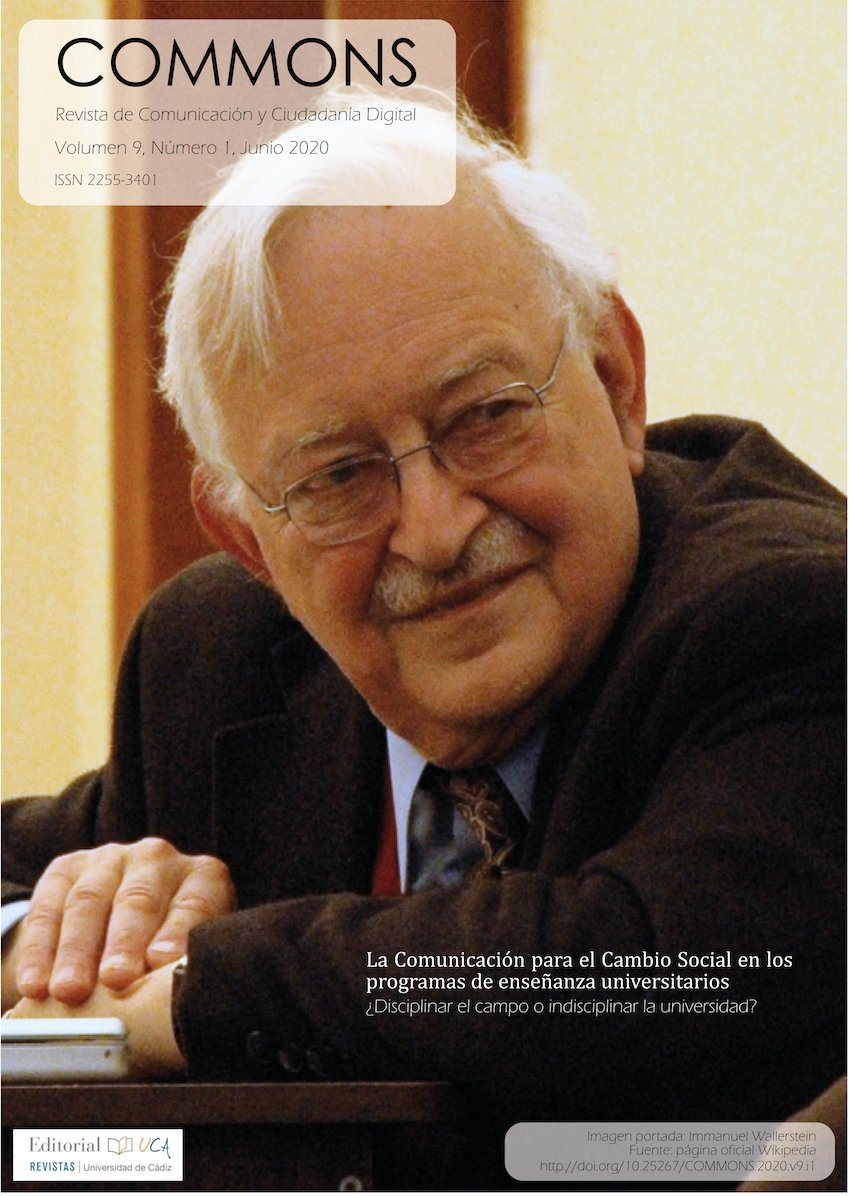Universidad y Comunicación Alternativa: quién cambia a quién / University and Alternative Communication: who changes who

Info
Abstract
Almost four decades ago, alternative communicators entered universities and met with theoretical debates in which they became involved from their transformative practical vocation. They participated in the movements of university transformation and in the struggles for the democratization of communication. They opened a professional field and suffered the effects of academic productivism. I review these routes here and try a provisional balance on what has been gained and lost, what has been suffered and what has been learned.
Keywords
Downloads
How to Cite
License
Authors who have published with this journal accept the following terms:
- Authors shall retain their copyright and guarantee the journal the right of first publication of their work, which shall simultaneously be subject to the Creative Commons 3.0 Recognition License, which allows third parties to share the work as long as its author and first publication are indicated in this journal.
- Authors may adopt other non-exclusive licensing agreements for the distribution of the published version of the work (e.g., depositing it in an institutional telematic archive or publishing it in a monographic volume) provided that the initial publication in this journal is indicated.
- Authors are permitted and encouraged to disseminate their work via the Internet (e.g., in institutional telematic archives or on their website) before and during the submission process, which may lead to interesting exchanges and increased citations of the published work. (See The Effect of Open Access).
References
ADORNO, Th. & HORKHEIMER, M. (1994). [1944] Dialéctica de la ilustración. Madrid: Trotta.
ALTHUSSER, L. (1988). [1970] Ideología y aparatos ideológicos del Estado. Buenos Aires: Nueva Visión.
AROCENA, R. & SUTZ, J. (2000). La universidad latinoamericana del futuro. México: UdUAL.
ARREDONDO, D. (2011). Los modelos clásicos de universidad pública. Revista Odiseo, 16. Querétaro: México.
BARTHES, R. (1991). El imperio de los signos. Madrid: Mondadori.
BECERRA, M. (2014). Medios de comunicación: América Latina a contramano. Revista Nueva Sociedad, 249, 137-148.
DE SOUSA SANTOS, B. (2010). La universidad en el siglo XXI. Para una reforma democrática y emancipatoria de la Universidad. Montevideo: Trilce-Udelar.
ECO, U. (1965). Apocalípticos e integrados. Barcelona: Lumen.
FALS BORDA, O. (1991). Acción y conocimiento. Bogotá: Cinep.
FEDERACIÓN UNIVERSITARIA DE CÓRDOBA (1918). Manifiesto liminar. La juventud argentina de Córdoba a los hombres libres de Sud América. La Gaceta Universitaria, 10, Córdoba, Argentina.
FREIRE, P. (1973). [1969] ¿Extensión o comunicación? La concientización en el medio rural. Buenos Aires: Siglo XXI.
GARCÍA CANCLINI, N. (1989). Culturas híbridas. México: Grijalbo.
HAZELKORN, E. (2009). Impact of Global Rankings on Higher Education Research and the Production of Knowledge. Unesco Forum on Higher Education, Research and Knowledge, Occasional Paper 15. Disponible en http://unesdoc.unesco.org/images/0018/001816/181653e.pdf
KAPLÚN, G. (2005). Indisciplinar la universidad. En C. Walsh (comp), Pensamiento crítico y matriz (de)colonial: reflexiones latinoamericana. Quito, Ecuador: Universidad Andina Simón Bolívar/Abya-Yala.
KAPLÚN, G. (2007). La comunicación comunitaria en América Latina. Medios de comunicación: el escenario iberoamericano. Madrid: Ariel.
KAPLÚN, G. (2010). Comunicación educativa y comunitaria: construcción de nuevos vínculos y sentidos en y desde la Universidad En G. Cyranek (org.), La comunicación para el desarrollo en Uruguay (pp. 15-34). Montevideo: UNESCO.
KAPLÚN, G. (2013). Viejas y nuevas tradiciones en la comunicación latinoamericana. Revista Latinoamericana de Ciencias de la Comunicación, 10(18), 66-76. Sao Paulo: Alaic.
KAPLÚN, G. (2014). La integralidad como movimiento instituyente en la universidad. Revista InterCambios, 1, 45-51, Montevideo: cse-UdelaR.
KAPLÚN, G. (2019a). Recorriendo el mapa y la historia. Muchos modos de ser y hacer universidad. En G. Kaplún & S. Franco Facundo y Martínez (orgs.), Vivir la universidad y la Comunicación. Montevideo: UdelaR.
KAPLÚN, G. (2019b). La comunicación alternativa entre lo digital y lo decolonial. Revista Chasqui, 148, 67-85.
KAPLÚN, M. (1985). El comunicador popular. Quito: Ciespal.
LANDER, E. (2000) (comp.). La colonialidad del saber. Eurocentrismo y ciencias sociales. Buenos Aires: Clacso.
LAZARSFELD, P. & KATZ, E. (1979). La Influencia personal. Barcelona: Hispano- Europea.
MARTÍN-BARBERO, J. (1987). De los medios a las mediaciones. México: Gustavo Gili.
MASSONI, S. (2007). Estrategia. Los desafíos de la comunicación en un mundo fluido. Rosario: Homo Sapiens.
MATTELART, A. (1977). Multinacionales y sistemas de comunicación. México: Siglo XXI.
MACBRIDE, S. et. al. (1980). Un solo mundo, voces múltiples. Comunicación e información en nuestro tiempo. México: Fondo de Cultura Económico.
MERTON, R. (1964). Teoría y estructuras sociales. México: Fondo de Cultura Económica.
MIGNOLO, W. (2007). La idea de América Latina. La herida colonial y la opción decolonial. Barcelona: Gedisa.
MIRANDA, E. & LAMFRI, N. (2016). Globalización neoliberal y productivismo académico: sus efectos en el trabajo de los profesores-investigadores de universidades argentinas. En C. da Cunha, Políticas de educação: cenários internacionais e regionais. Brasília: Líber Livro-Catedra Unesco/UCB.
PÉREZ MORA, R. & NAIDORF, J. (2015). Las actuales condiciones de producción intelectual de los académicos. Sinéctica, 44. Disponible en http://www.scielo.org.mx/scielo.php?script=sci_arttext&pid=S1665-109X2015000100008
PICHON-RIVIÈRE, E. (2001). El proceso grupal. Del psicoanálisis a la psicología social. Buenos Aires: Nueva Visión.
RINESI, E. (2019). La educación superior en América Latina a cien años de la Reforma Universitaria. Integración y Conocimiento, 8(2), 94-11. Córdoba: NEIES-MERCOSUR.
SEGURA, S. & WAISBORD, S. (2017). Media Movements: Civil Society and Media Policy Reform in Latin America. The University of Chicago Press.
SHANNON, C. & WEAVER, W. (1971). The mathematical theory of communication. University of Illinois Press.
SKINNER, B. (1978). Reflexiones sobre el conductismo y la sociedad. México: Trillas.
WALSH, C. (2017). ¿Interculturalidad y (de)colonialidad? Gritos, grietas y siembras desde Abya-Yala. En A. Garcia Diniz et al. (orgs.), Poéticas e políticas da linguagem em vias de descolonização. Sâo Carlos-Brasil: Pedro & Joâo Editores.


